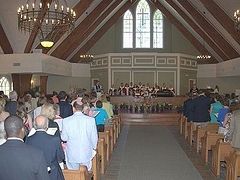August 06, 2015

Two Latin American branches of the Presbyterian church have ended their association with the Presbyterian Church (USA) over the PC (USA)’s decision to accept gay clergy and to sanction gay marriage.
The Independent Presbyterian Church of Brazil (IPIB) and the Evangelical Presbyterian and Reformed Church of Peru (IEPRP) had been in disagreement with the PC (USA)’s evolving views on gay marriage since 2011 when the church passed Amendment 10a which allowed church leaders to ordain gay clergy members.
The IPIB has been a partner of the PC (USA) for 40 years, as stated on the PC (USA)’s website.
The IPIB issued a statement of deep regret, but firm conviction concerning their separation with the PC (USA).
“We cannot help but express our deep gratitude to God for the life and ministry of the Presbyterian Church of the United States. As a country and as a church we have been very blessed by this church ever since the first Presbyterian missionary arrived here in 1859.”
The statement continues: "Despite this notable contribution to the expansion of God's Kingdom in the world and especially in Brazil, our church has understood that the recent decisions made by the PC(USA) are against the principle of the authority of Scripture over the life and faith of the Church, as well as the confessional documents of our common Reformed heritage."
The PC (USA)'s Amendment 14-F decision this past March, which changed the way the church defines marriage, was enough for the IPIB and the IEPRP to officially severe ties.
According to The Christian Post, this is not the first time the PC (USA)’s new policies have caused conflict with associated denominations.
In 2011, the National Presbyterian Church of Mexico also voted to separate from the PC (USA), and other churches associated with the PC (USA) in Latin America and the Middle East have released statements disapproving of the PC (USA)’s new definition of marriage.



